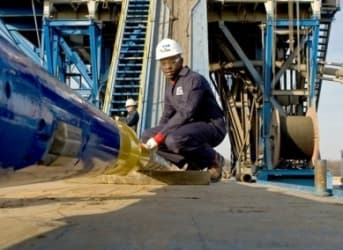Is fracking the way forward?
The answer of course depends on how you define forward, and further, if that path is a straight line. Consider the myriad of public and private objectives: enhanced domestic production and greater energy independence; increased influence abroad; or climate change mitigation through a carbon-neutral or even zero-carbon economy.
This list is hardly complete, and the answer isn’t either. In a political and environmental setting that is increasingly black-and-white, fracking is an uncomfortable shade of gray.
Starting with what we know, hydraulic fracturing has changed the game. You’ve probably already heard, but U.S. crude oil production is up more than 85 percent, or some 4.5 million barrels per day since 2008, after years of steady decline; dry natural gas production rose more than 25 percent in that time.
As a result, U.S. crude imports declined 20 percent between 2010 and 2014 and nearly $5 billion in LNG import infrastructure has been left largely idle. The rest – and its aftermath – is less clear. Related: The Rationale Behind Russia’s Withdrawal From Syria
Economically, fracking’s impacts range from downright impressive to decidedly neutral. The shale boom created jobs; and it did so at a rate nearly 40-times greater than that of total private sector employment from 2007 to 2013. The full unconventional value chain is estimated to support over 2 million jobs and more than $150 billion in earnings. Further, residential, commercial, industrial, and electric power customers saw gains of approximately $74 billion combined in the aforementioned period. Adding in oil – and the resultant drop in gasoline prices – IHS estimates that households save roughly $2,000 annually due to unconventional production.
Still, stories of its success are often oversold, and a lot has happened since shale’s heyday only a few years ago. Since October 2014, the U.S. has shed roughly 100,000 oil and gas industry jobs, some 16 percent of employment at its peak. The U.S. economy has added over 3.5 million jobs in other sectors over the same period. Low commodity prices have inordinately burdened producing states, where local economies are now markedly less diverse.
Nationally – while certainly a boon – low prices have not contributed to the type of manufacturing renaissance many had hoped for. The onset of LNG exports brings hope, but the widening trade deficit speaks to unconventionals’ rapid depletion rates and relative impotence internationally to date. Related: Dear President Trump or President Clinton, Here is Your Energy Agenda
Changing directions, let’s again begin with what we know: fracking affects climate change through numerous processes. However, the costs – both positive and negative – along with the externalities, data gaps, and latent uncertainties conspire to create some difficult and ever evolving math. Interpretations vary and disputed science is the name of the game.
The Environmental Protection Agency’s milestone 5-year study, which found no widespread, systemic evidence of water contamination, is now under question by the agency’s Science Advisory Board. Other research suggests natural gas is a valuable tool to reduce greenhouse gas emissions, though competing studies, examining leaked methane and its effects, repudiate that claim.
Uncertainty will only grow as companies look to quickly push the technological limits in this low-price environment. Pioneer, Devon, Hess Corp, and Whiting Petroleum are among many applying carbon dioxide to late-stage wells, increasing the amount of proppant, or adding more stages to maximize production. Related: Despite Fundamentals, Oil Surges Above $40
The economic effect of fracking on clean energy development is similarly vague and lacking complete study. On the whole, natural gas is replacing coal in the electric generation profile, filling gaps that renewables hope to satisfy. For many states however, new renewable generation from wind is more economically effective (states retain a higher percentage of dollars spent and labor is kept primarily within local communities) than that of coal or gas. If allowed to extrapolate, the size and scope of hydraulic fracturing operations is, at the absolute least, a $250 billion question.
ADVERTISEMENT
For its part, the U.S. administration is cautiously keeping both feet in the middle (see: stiffening, though reactive regulations, and promotion of natural gas as a bridge fuel) – a stance that will redefine but not end the shale gas revolution. As science slowly lumbers in, and as renewable technology approaches widespread viability – it’s not quite there – the middle is about right.
By Colin Chilcoat of Oilprice.com
More Top Reads From Oilprice.com:
- ‘’Iran’s Return To The Oil Markets Less Damaging Than Expected’’
- Oil Prices Rally To 2016 Highs On Weaker Dollar
- Oil Industry On Edge As Political Turmoil In Brazil Rages On


















I believe the health and clean water/air/planet aspects of shale production are under-reported and over-discounted by the petroleum industry. But in the short term, costs that are outside the cost-accounting systems of these companies will naturally be ignored. "Somebody else" pays the bills for healthy living and sound ecology.
Meanwhile, what the petroleum industry will for sure pay attention to -- today -- is the immediate cost of production. As the author points out, cost data and profitability for fracking are all over the place. I hope that we will re-double our efforts to get a handle on the very wide variation in today's production cost and investor risk. We need to figure out if even a short-sighted petroleum industry can reasonably consider fracking a way forward -- even before folding in costs that they currently externalize to everybody else.
Can we put together a good picture? I look forward to additional articles along the lines of this one.
Interesting perspective from Schlumberger -- and it's not confirming that we have employed cheaper, "miracle" methods and technologies -- at least, not yet.
http://phx.corporate-ir.net/External.File?item=UGFyZW50SUQ9MzI4MzU5fENoaWxkSUQ9LTF8VHlwZT0z&t=1&cb=635941586105090373